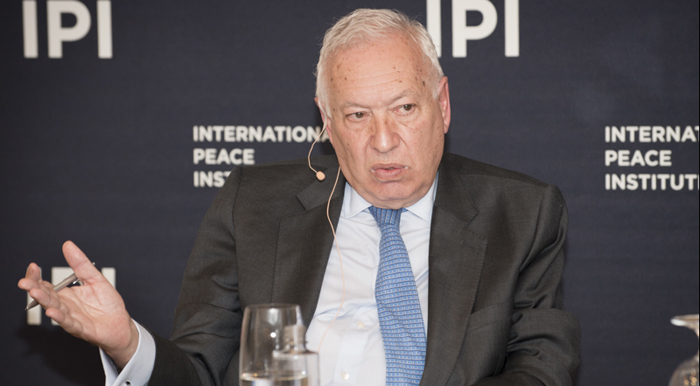
José Manuel Garcìa-Margallo, Spain’s Minister of Foreign Affairs and Cooperation, pledged support to a lasting two-state solution for the Israelis and the Palestinians, and asserted that the Assad regime must be removed to alleviate the humanitarian crisis in Syria.
Speaking at IPI on May 6th during a presentation entitled “Challenges in the Middle East: The Palestinian-Israeli Peace Process and Syria,” Spain’s top diplomat urged both the Israelis and the Palestinians to make real and tangible compromises for the sake of a stable and durable peace, at the same time guaranteeing strong backing to the process from both Spain and the European Union.
“The goal is to achieve a two-state solution [with] open borders based on the 1967 lines…with a viable, contiguous, sovereign, and independent Palestinian state,” Mr. Garcìa-Margallo said. The new Palestinian state, he added, would then exist “side by side in peace with an Israel living with recognized and secure borders.”
He praised US Secretary of State John Kerry’s peace efforts, but said that they are facing their most challenging moment so far. At the same time, he urged Israel to halt its settlement activity and called on the Palestinians to recognize Israeli borders, as goodwill gestures on both sides.
“Israel must realize that the occupation is contrary to the principles of justice and detrimental to the health of Israeli democracy,” Mr. Garcìa-Margallo said. “As for the Palestinians, we expect that the reconciliation agreement between Fatah and Hamas will lead to… the recognition of the right of Israel to exist.”
Israel has assailed that reconciliation, saying it cannot negotiate with Hamas unless the group recognizes Israel’s right to exist as a Jewish state.
Mr. Garcìa-Margallo acknowledged that the path to peace will not be easy. Ultimately, he warned, although the process can rely on strong European support, a durable solution will be impossible without the leadership of the United States.
“We [Europeans] can accompany the process, but I don’t think the European Union can draft a single political path,” he said. And while praising Mr. Kerry’s efforts, he also recognized that the current domestic political climate in the United States is likely to further complicate the process.
On Syria, the Spanish foreign minister made it clear that an ultimate goal is the removal of the Assad regime through peaceful means.
“In Syria, we are looking for a change of regime,” Mr. Garcìa-Margallo said. He also noted, however, that Assad believes there is a military solution to the conflict, and that he is winning.
Mr. Garcìa-Margallo also discussed the Geneva process and Western efforts to bring the warring parties in the Syrian conflict to the negotiating table. He said that the entire process, and the “Geneva II” talks in particular, have been largely unsuccessful.
The West understood the first Geneva communiqué as “establishing a transitional, unity, national government” that would eventually require Assad to step down, he noted. But the Russian negotiators had a different understanding as to Assad’s future status, a complication that has led to the current diplomatic paralysis, Mr. Garcìa-Margallo said.
The Spanish foreign minister also argued that Iran should have been included at the negotiating table. “I think we made a mistake not inviting Iran to Geneva II,” he said. “Iran is a key player in the area” because of its regional clout, but also because of its strong influence on the ground in the conflict itself, he said.
Going forward, Mr. Garcìa-Margallo indicated that many leaders in the region believe that unless the international community finds an alternative to the current Geneva framework, the conflict may last for an additional three or four years.
For now, Mr. Garcìa-Margallo reassured the international community that Spain will “continue alleviating the suffering of the Syrian people and the plight of the refugees in the region.”
Asked why Spain has not done more to ease the humanitarian crisis by opening its borders to some of the refugees, Mr. Garcìa-Margallo admitted that the European Union has not done enough. But he also said that the Syrian crisis has coincided with a serious economic crisis across all European countries, which has created economic and political resistance to the idea of welcoming Syrian refugees.
IPI President Terje Rød-Larsen moderated the discussion.







